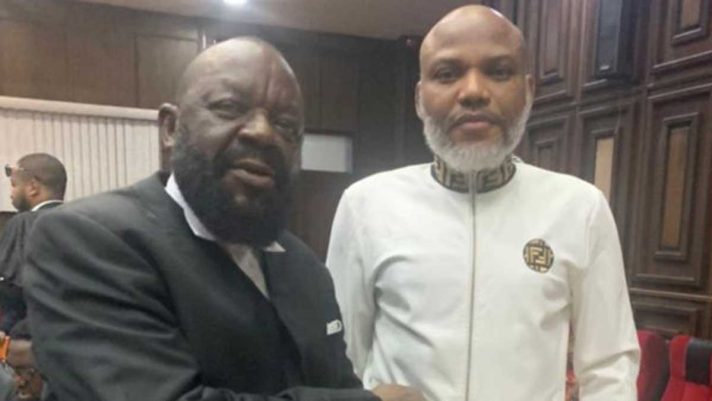
Amidst the increasing clamour for his freedom, the leader of the Indigenous People of Biafra (IPOB), Nnamdi Kanu, has declared that his release should be based on adherence to the rule of law rather than an act of clemency, pardon, or amnesty.
Speaking through his lawyers during a courtesy visit at the weekend, Kanu insisted that complying with existing court rulings should be the guiding principle in his case.
According to Aloy Ejimakor, his lead counsel, Kanu explained that the judgment of a Federal High Court had already declared his arrest and detention unconstitutional, while international tribunal decisions have separately held that his detention is unlawful.
“I am adamant that nobody should plead or beg on my behalf because I have committed no crime,” Kanu asserted.
He further emphasised that self-determination, which has been misrepresented as a criminal act, is an inalienable right recognised under Nigerian law, the United Nations, the United Kingdom, and Kenya.
Ejimakor echoed Kanu’s stance, stressing that his release should be seen as a necessity under the rule of law rather than an act of goodwill.
“While those calling for his release may be sincere, appeals for pardon or clemency could be misinterpreted as legitimising his continued prosecution, which does not align with constitutional and treaty obligations,” Ejimakor stated.
He urged advocates for Kanu’s release to adopt the firm legal arguments used by groups such as Afenifere, Ohaneze, World Igbo Congress (WIC), ranking members of the National Assembly, American Military Veterans of Igbo Descent (AVID), the international community, among others.
He noted that these groups have consistently argued that Kanu deserves to be freed because he has committed no legally recognised offence.
Ejimakor further criticised the Nigerian government’s role in Kanu’s extraordinary rendition, labelling it a state crime under international law.
“If any begging must be done, it should be directed to the Courts to conduct his cases and that of IPOB with the utmost impartiality and adherence to the rule of law, equity and good conscience,” Ejimakor stated.






